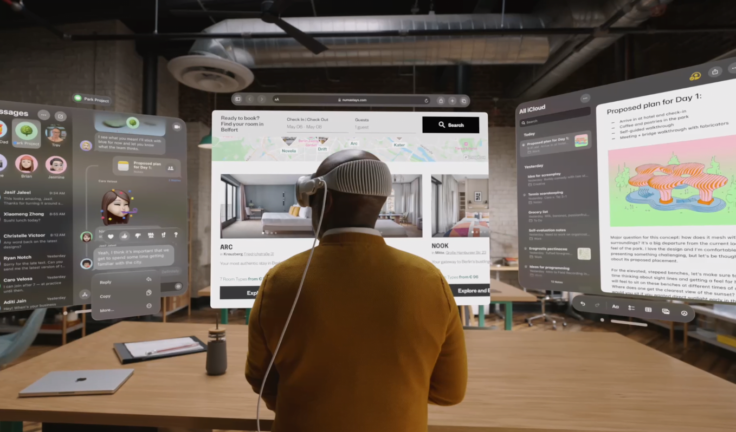Silicon Valley-based tech giant Apple lives by its motto, “Think Different,” reminding us each time they take the stage to reveal what updates and new releases they have in store for their loyal consumers. Since the firm’s founding in 1976, the American manufacturer of personal computers, smartphones, and tablets has constantly strived to push the boundaries of innovation and change to an extent many would never have thought possible to ever reach.
As it did with the introduction of MacBooks and iPhones to global markets, respectively in 2006 and 2007, Apple stunned the world once again this week during the tech company’s annual Worldwide Developers Conference in Cupertino, California, by lifting the veil on its latest creation, one that has stark potential to quite literally shift our perception of and on life. Enter Apple Vision Pro: a futuristic ski-mask-looking headset that “seamlessly blends the real world and the virtual world together,” per CEO Tim Cook.
Authoring a new chapter in the short-lived history of artificial intelligence (AI), the newly-disclosed plans for the upcoming virtual reality (VR) device not only promise to match the level of ingenuity and genius shown in Apple’s previous products, but will also set a precedent in the way we will integrate technology into our daily lives while redefining the ways we communicate, work, and engage with the world around us.
From what has transpired from the company’s official event, Apple’s Vision Pro headset will provide a multi-sensorial experience to its users, using eye and hand movements, as well as voice commands, to take full control of the goggles of tomorrow. Expected to bear more pixels than a 4K television, the immersive technological tool is believed to be taking the entire realm of virtual reality to a completely different level, trouncing most competitors that have already made their takes on VR available on the market by quite a mile.
“Built upon decades of Apple innovation, Vision Pro is years ahead and unlike anything created before— with a revolutionary new input system and thousands of groundbreaking innovations,” Cook revealed. “It unlocks incredible experiences for our users and exciting new opportunities for our developers.”
Amongst some of Vision Pros’ main features, which is expected to launch early next year and retail at a price point of $3499, users will be able to wirelessly connect their Macs with their headset allowing them to expand its size and functionality and transform any room into their own creative space by dimming surrounding lights and focusing on the device’s own projection, while also enhancing the experience of video capture by incorporating a 3D camera, the first-ever to be engineered by Apple.
Poised to become the Apple CEO’s signature addition to the company’s already rich range of products, the potential era-defining futuristic specs, labeled by Cook as the “first Apple product you look through and not at,” have been raising a few eyebrows since their announcement.
Might be a bit more enthusiastic for the Apple Vision if it didn’t look like you were paying three grand and a half to be the lonely protagonist of a Black Mirror episode. pic.twitter.com/OMepFeYIgB
— Cethan Leahy (@CethanLeahy) June 6, 2023
Inherently reminiscent of an iconic Black Mirror episode in the series’ first season, in which human beings can re-watch and almost tangibly relive memorable moments of life thanks to a memory implant that records everything they do, this new generation of headsets evokes questions about the role they may have in shaping our perception of memory as well as of our own intricate human experience, prompting us to ponder over their implications on personal privacy and the nature of memory.
The idea of being able to record every single moment of life can indeed sound appealing and enticing at first sight, yet, as it blurs the line between the authentic and the curated, collectively challenging our perspectives of reality and potentially distorting the essence of our own memories, we can only wonder if the act of reliving experiences through a manufactured lens undermines the organic and imperfect nature of human recollection itself.
As technology continues to advance and as human beings become more and more reliant on it, the need for critical reflection and thoughtful consideration of the consequences becomes increasingly important, especially as the line between the real and digital keeps on blurring.





